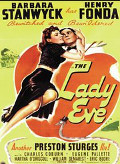
Directed by
Preston Sturges
94 minutes
Rated PG
Reviewed by
Bernard Hemingway

The Lady Eve
Barbara Stanwyck plays a grifting adventuress who, with her card-sharp father (Charles Coburn), works the cruise ship circuit fleecing the idle rich. Quick to fall into their web of deceit is Charles Pike (Henry Fonda), the bookish heir to a brewery fortune but the results are not what they expected.
The Lady Eve is a highly-regarded entry in the “screwball” comedy genre. Based on a story by Monckton Hoffe and adapted by Sturges for the screen the story makes passing use of the hoary Biblical tale of Adam and Eve for a battle of the sexes romp that occasionally amuses but mostly feels over-familiar.
The over-familiarity stems from the era-typical setting of first class ocean travel, very wealthy Americans mixing with (pretend) British aristocracy and the roster of character actors such as Coburn, Eugene Pallette, William Demarest and Eric Blore going through their familiar paces. None of this would matter of course if the comedy didn’t feel so laboured.
Whilst the script has a good deal of lively repartee and occasional cheeky innuendo the biggest problem is that Fonda is no comic actor and for that matter not much of romantic lead. Subjected to various indignities by Sturges’s script the actor looks most of the time like he wished he could be somewhere else (it really needed Cary Grant to pull off this sort of material but of how many films could one say that?). For that matter Stanwyck, dynamic as she always is but also quite flinty, is not better suited to the role of calculating flirt who inexplicably forms an unquenchable attachment to the woodenly slow Fonda who is equally inexplicably sweet on her.
Most of the limited fun comes from the support players especially Coburn and Eric Blore who is a hoot as a fake blue blood.
FYI: Coburn would turn up playing the target of Marilyn Monroe's gold-digging attention in Howard Hawks’s thematically-related Gentlemen Prefer Blondes (1953)
Want something different?





